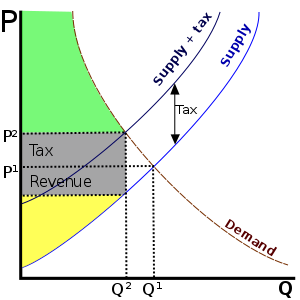Brazil’s tax system is archaic and absurdly complicated. There are many reasons for this. Maybe the most important one is that -in contrast to Europe- the federal states control the indirect taxes (like VAT or sales taxes), while the federal government control the direct taxes (like income taxes for persons and companies). As a result, selling from one state to another can be almost as complex as exporting to another country.
Taxes
CIDE-Combustíveis
CIDE-Combustíveis (CIDE tax on fuels) The Contribuição e Intervenção no Domínio Econômico-Combustíveis” applies to the import and marketing of gasoline, diesel, jet kerosene and other oils fuels (fuel oil), liquefied petroleum gas (LPG), including that derived from natural gas and naphtha, fuel and ethyl alcohol. It must be paid by those who import or commercialize the fuels covered by the …
CSLL
CSSL (Social Contribution on Net Corporate Profits; Contribuição Social sobre o Lucro Líquido) In addition to Corporate Income Tax (IRPJ) the Brazilian companies are subject to the payment of the social contribution on the net profit (“CSLL”). CSLL is charged separately form the IRPJ, given that the CSLL is paid to the social security and not to the …
ICMS
Tax on the Circulation of Products and Services (“ICMS”; “Imposto sobre Operações relativas à Circulação de Mercadorias e Prestação de Serviços de Transporte Interestadual e Intermunicipal e de Comunicação”) For beginners The Tax on Circulation of Goods and Services (ICMS) is the main State tax, and is due on operations involving circulation of goods (including manufacturing, marketing, …
IE
IE (Export Tax; Imposto sobre a Exportação) The export tax is due upon the export. This tax has an ad valorem tax rate that is applied according to a limited product list and varies according to the type of product that is being exported.
IGF
IGF (Tax on large fortunes; Imposto sobre grandes fortunas) The tax on large fortunes (IGF) is a tax of Brazil . It is a federal tax, ie, only the Union has power to institute it (Art.153, VII of the Constitution ). Although defined in the Constitution, the IGF has not been regulated by complementary law , …
II Import tax
II (Import tax; Imposto de importação) The Import Tax (II) is a federal tax and has protection purposes. The Import Tax rate varies according to the country of origin of the goods and to the classification of the product (according to the custom tariff used). Brazil use a system called “Mercosur Common Nomenclature” (NCM) to classify import duty …
IOF
Tax on Financial Operations (IOF) The tax on Financial Operations – IOF – will be applicable on some incoming foreign investment which will imply on equity funds, debentures and market-market funds. As defined by the IOF Regulation107, such tax is assessed on different types of events: foreign exchange credit securities insurance [important] To stimulate the Brazilian economy, …
IPI
Tax on industrialized goods (IPI – Imposto sobre Produtos Industrializados) IPI is not cumulative; and thus tax due may be offset by credits arising from the purchase of raw materials, intermediary products, and packaging materials. However, no credits are granted for goods that become fixed assets. The rates at which IPI is charged on the value of industrialized goods, …
IPTU
IPTU (Urban Building and Land Tax; Imposto sobre a propriedade predial e territorial urbana) The tax on urban property and land, IPTU (property tax) is a tax of Brazil established by the Federal Constitution which applies to the urban property. This tax is being charged by the local municipality. IPTU is paid every year, by …
IPVA
IPVA (motor tax, Imposto sobre a Propriedade de Veículos Automotores) IPVA is a motor tax applied to the possession of motorized vehicles. IPVA is a state tax and must be paid by anyone who owns a motorized vehicle. The tax is due annually from the 1st January of each fiscal year. The basis for calculating the tax, when …
IRF
IRF (Income tax at source; Imposto de Renda na Fonte) IRF is due on income paid, credited, remitted, or delivered to non-residen,s, and other income, such as prizes, advertising services provided by legal entities and remuneration for services provided by legal entities. at the rate of 15% or 25% depending upon the beneficiary’s country of residence and the …
IRPF
Individual Income Tax (“IRPF” or Imposto de Renda de Pessoa Física) Brazilian law distinguishes resident from non-resident individuals. Generally, a Brazilian national is automatically a resident when he/she is legally domiciled in Brazil or, if not domiciled in Brazil, as of his/her election to be treated as a resident for tax purposes. As regards foreign individuals, however, specific …
IRPJ
IRPJ (Corporate Income Tax; Imposto sobre Renda de Pessoa Jurídica (IRPJ) Brazilian Income Tax Rules stipulate that income tax is due as earnings and profits are accrued, regardless the manner in which the corporate entity is organized and established (including “de facto” companies, professional firms in general and cooperative societies). Brazilian companies are subject to IRPJ which is levied …
ISS
Services Tax (“ISS”) ISS is a municipal tax levied on the supply of any type of services, as defined in federal Supplementary Law (LC). This tax is currently governed by Supplementary Law (LC) no. 116/03. The rate of ISS varies between 2% and 5%. ISS is due generally for the Municipality where the establishment rendering services …
ITBI
ITBI (Property Transfer Tax ; Transfer tax imposto sobre a transmissão de bens imóveis e de direitos a eles relativos) Property Transfer Tax (Imposto sobre a Transmissão de Bens Imóveis – ITBI) is a tax assessed by municipalities, payable when real estate property or rights in rem to any real estate property (except those in guarantee) are transferred, or upon assignment …
ITR
ITR (Rural Real Estate Tax; Imposto territorial rural) Currently, the rural real estate property tax (ITR) is charged by the Federal Government. The rate used varies with the area of the property and its level of use. The calculation basis is the value of land without any kind of improvement or improvement (including plantations): that is, the value …
PIS and PASEP
PIS and PASEP The PIS and PASEP are social contributions payable by companies to finance the funds for insurance for unemployment , child benefit and allowance for low paid workers. PIS is short for “Programa de Integração Social” and PASEP stands for ” Programa de Formação do Patrimônio do Servidor Público“. Both programs are better known by the acronym PIS/PASEP. The current …
COFINS
COFINS Contribution for the Financing of Social Security (COFINS) is a federal contribution, tax, levied on gross revenue of businesses in general, intended to finance social security . Its rate is 7.6% for business income taxed by real (systematic non-cumulative) and 3.0% for the other. It is based on calculation: The monthly revenue (gross revenue …








